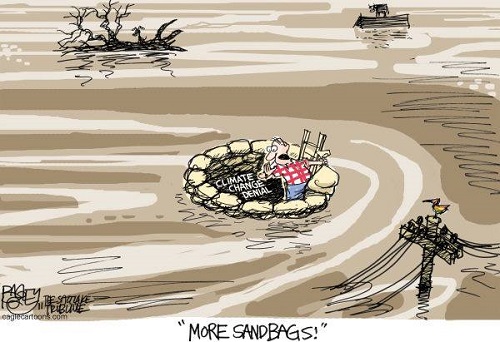2014 SkS Weekly Digest #4
Posted on 26 January 2014 by John Hartz
SkS Highlights
Dana's Climate scientist Dessler to US Senate: 'Climate change is a clear and present danger' and John Cook's Three perfect grade debunkings of climate misinformation generated the most comments of the articles posted on SkS during the past week.
Toon of the Week
h/t to I Heart Climate Scientists
Quote of the Week
Finally, (Nicholas) Stern says things have moved on in the eight years since his review. "I would have been much fiercer", he says. "Emissions have gone up faster than I thought and some of the effects of global warming are coming through more quickly, such as melting of the glaciers and the polar ice caps. But technical change has been faster too."
Stern says that on present trends global temperatures will be 4-5C higher in the next century and governments are fooling themselves if they think this will only have a modest impact on their economies.
"The last time we had a change in global temperatures of this order of magnitude it was in the other direction. It was called the Ice Age."
Lord Stern: I should have been fiercer in climate change review by Larry Elliott, Economy Blog, The Guardian, Jan 23, 201
SkS Week in Review
- 2014 SkS Weekly News Roundup #4B by John Hartz
- Answering questions about consensus in a MOOC webinar by John Cook
- More global warming will be worse for the economy, says Copenhagen Consensus Center by Dana
- It’s all a Question of Balance by Glenn Tamblyn
- 2014 SkS Weekly News Roundup #4A by John Hartz
- Tony Eggleton offers an excellent introduction to climate change by John Abraham
- Three perfect grade debunkings of climate misinformation by John Cook
- Climate scientist Dessler to US Senate: 'Climate change is a clear and present danger' by Dana
Coming Soon on SkS
- Cowtan and Way: Surface temperature data update (Kevin C)
- Warming oceans consistent with rising sea level & global energy imbalance (Dana, Rob Painting & Kevin Trenberth)
- Corrections to Curry's Erroneous Comments on Ocean Heating (Dana, Rob Painting)
- Dodgy Diagrams #1 - IPCC Residence Time Estimates (Dikran Marsupial)
- The Oceans Warmed up Sharply in 2013: We're Going to Need a Bigger Graph (Rob Painting)
- 2014 SkS Weekly News Roundup #5 (John Hartz)
In the Works
- New Video: Climate, Jetstream, Polar Vortex (Peter Sinclair)
- Deep Ocean Warming: The Coriolis Effect (Rob Painting)
- A Historical Perspective on Arctic Warming: Part One (Robert Way)
- Why rainbows and oil slicks help to show the greenhouse effect (MarkR)
- Rebuttal to the myth 'CO2 is saturated' (Glenn Tamblyn & jg)
- Saving the Keeling curve (Doug Bostrom)
- Thirteen Years of Moths and Flames (jerryd)
- Honey, I mitigated climate change (Ari Jokimaki)
SkS in the News
Brian Martin basis a section of his new book The Controversy Manual on the Debunking Handbook co-authored by John Cook and Stephan Lewandowsky.
In his article, Wasting energy on climate change sceptics posted on The Drum (ABC TV Australia), Greg Jericho links to two SkS articles: What were climate scientists predicting in the 1970s? and Is there a scientific consensus on global warming?
Suffolk County (New York) Community College created a news release from John Cook's article, Three perfect grade debunkings of climate misinformation. The news release was in turn posted on the Facebook page of the community college.
SkS Spotlights
From the back cover of a new book, The Controversy Manuel by Brian Martin:
Climate change, psychiatric drugs, genetically modified organisms, nuclear power, fluoridation, stem cell research - these are just a few of the hundreds of issues involving science and technology that are vigorously debated. If you care about an issue, how can you be more effective in arguing for your viewpoint and campaigning in support of it? The Controversy Manual offers practical advice for campaigners as well as plenty of information for people who want to better understand what's happening and to be able to discuss the issues with friends.
The Controversy Manual provides information for understanding controversies, arguing against opponents, getting your message out, and defending against attack. Whether experts are on your side or mostly on the side of opponents, you'll find advice for being more effective. While not taking sides on individual controversies, the emphasis is on fostering fair and open debate and opposing those who use power and manipulation to get their way.
The author, Brian Martin, is professor of social sciences at the University of Wollongong, Australia. He has been involved in and studied scientific and technological controversies since the 1970s, and is the author of numerous publications addressing controversy dynamics.































 Arguments
Arguments































Comments